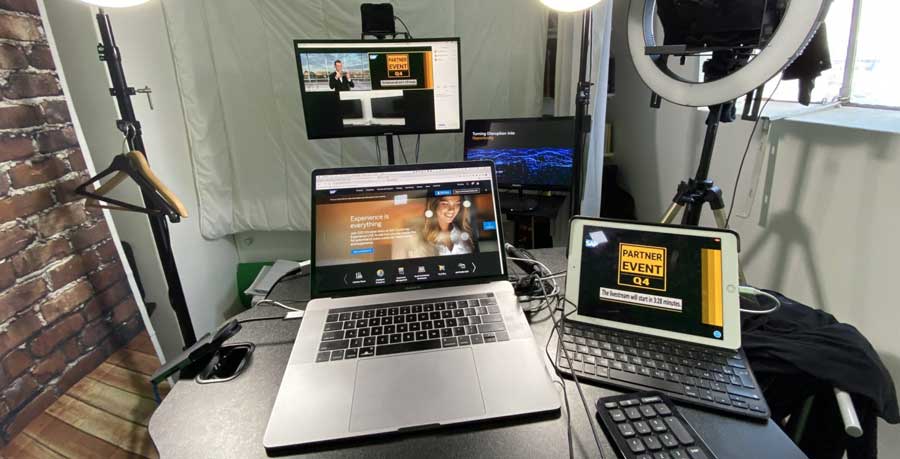How to Plan and Host a Virtual Panel Discussion
Virtual discussions have been commonplace for educational webinars and office training for a long time. However, the pandemic has increased this number by a large fold. Be it a classroom discussion or a company meeting, virtual interaction has become second nature for people worldwide.
|
Live stream widget for virtual events Stream your event directly on your website |
This recent shift calls for a better and more consolidated way of virtual interaction. Panel discussions, which encourage dialogue and discussion among experts from different fields, are a great way to collect and present different perspectives forward.
It brings a more holistic perspective on the topic of discussion, adding more value to the audience.
In this article, we’ll go through some steps for planning and hosting a successful virtual panel discussion to help you get started on the right foot.

First, prepare well before the event
Being prepared with an affirmative attitude well before the event is a prerequisite for success. It sets the tone for the flow of the event and ensures nothing gets lost in action.
This is crucial, so everything gets done beforehand, and you can focus on things of greater importance as the event date comes nearer.
Here are some best practices when it comes to preparing for a virtual panel:
-
Research your topic well and create a flow of the expected conversation (or schedule).
-
Conduct thorough, in-depth research before presenting the idea to the speakers. ** Make sure to choose a topic that is currently trending - something people want to hear about. Try doing market research and take polls to come up with the topic people in the community want to hear more about.
-
Brainstorm ways to get more people to attend the discussion (online giveaways, referral programs, etc.).
-
Pick a good time for the webinar and get a confirmation from the speakers or celebrity guests.
-
Discuss the event flow (opening, middle, end).
-
Make technical arrangements well in advance and list out the equipment you will need (lighting, sound and audio hardwire, cameras, backdrops).
-
Find a host!
These practices will help you understand your upcoming responsibilities for the event and prepare for them.
Pick your panelists wisely
Finding panelists who align with your event goals is crucial to ensure the message you’re trying to convey through the event remains intact.
Before you proceed, have a selection criterion, pass it through the board members of the event, and let it guide your panel search.
Here’s how to select the right panelists for your event:
-
Ensure the panelists understand the purpose of the event and what you’re trying to achieve through it. ** Look for panelists that align with your event and are an expert in the discussion topic. Think of them like influencers - the more followers they have, the more attendees you'll receive.
-
There should be diversity in the speakers you choose to bring different perspectives to the table. If all of your guests came from the same background or experience, there wouldn't be any room for discussion or debate. Look for participants that are well-researched, passionate and open to what others have to say.
-
Calling a thought leader or expert from the industry can help establish event credibility, so take that under consideration.
-
Have a conversation with the panelists to understand what they’re expecting from the event. Also, convey your expectations and ideas to ensure you agree and the event proceeds as intended.
Being the moderator of the meeting, you have the opportunity of picking the best speakers for a valuable discussion. Leverage that power.
Create an event flow
Before the event, create a rough flow of how you want the discussion to pan out and share it with the speakers and other event members. This will avoid confusion among the participants.
Nobody likes pointless deviation from the actual topic discussion; thus, a well-framed time balanced flow of a topic would help moderate and succeed. T
ry to make your content engaging to keep the discussion interesting. For this, it would be best to do a sit-down with the speakers and encourage everyone’s participation in creating the flow. Talk about questions, perspectives, angles, tone, and transitions. This flow will guide the discussion and help bring it back on track if it loses course in between.
For this, it would be best to do a sit-down with the speakers and encourage everyone’s participation in creating the flow. Talk about questions, perspectives, angles, tone, and transitions. This flow will guide the discussion and help bring it back on track if it loses course in between.
A pro tip here would be to conduct a mock seminar with all the participants before the actual one. This can be a brief 15-minute discussion but can play a significant role in the successful conduction of the event.
Keep the audience engaged with polls, Q&As, gamification
Grabbing the audience’s attention and keeping them engaged throughout the discussion can be a challenge for anyone hosting the webinar.
However, it’s crucial to keep them hooked.
Fortunately, there are many ways you can keep the interaction more interesting and free-flow:
-
Use polls and comments
-
Encourage questions from the audience
-
Engage them by involving them in activities like upvotes
-
Ask the audience to share their opinions on the ongoing discussion in the chat section
-
Keep some time for a networking session
- Provide printable material and guides that guests can follow along with during the discussion
Don't forget about gamification! Most virtual experiences, especially ones that are lecture style, incorporate some sort of gamification into their events. 
Test equipment and do a dry run before the event
Before the event, it would be best to conduct a dry run test to ensure everything works smoothly. These include the camera, microphone, and network signal- the most unreliable yet crucial part of conducting a glitch-free online discussion.
Understandably, a technical glitch can happen.
However, doing a dry run can significantly reduce the chances.
Here are some ways to ensure everything is correct on the tech front:
-
Keep an alternative data network in case the primary one fails.
-
Try calling your friends or family members to test the signal. Or run a beta test panel.
-
Join the session through a computer rather than from a phone; it helps frame a more professional picture and ensures a good network connection.
-
Encourage the speakers to join 10 minutes before the discussion to avoid any delays.
- Run multiple equipment checks!
You can use a secondary camera using GoPro devices, which supports a better resolution video for such occasions. Including a secondary camera or recording device acts as a great backup in case the originals malfunction.
Once your event tech is sorted, you’re ready!
Ensure the questions are related to the conversation
A good panel discussion has questions in the end, either asked by the moderator or audience.
This question-answer session is crucial because it gives more depth to the discussion and helps resolve doubts. However, sometimes these questions can take a different discourse than the conversation and confuse the audience.
To avoid this, get your questions pre-approved by the speakers. This will ensure the questions align with the conversation and can provide more clarity to the topic.
There should be a positive synergy between you and the panelists regarding the topic. This will keep the viewers engaged and make the webinar impressive.
|
An integration for streaming on your website Stream your virtual panel directly from |
Conclusion
A virtual panel discussion can have some challenges, but can be highly successful and valuable to the audience. The key is to make the interaction practical and interactive for both the speakers and the viewers.
Experiment with different ways to interact with the audience and keep them hooked. Once you become comfortable with what you do and find it successful, it’s easy to conduct sessions going ahead.
As the world moves more towards digitalization, remote work and discussion will take over physical interaction and meetings.

Author: Adela Belin
Adela Belin is a content marketer and blogger at Writers Per Hour. She is passionate about sharing stories with the hope to make a difference in people's lives and contribute to their personal and professional growth.







